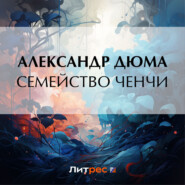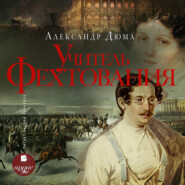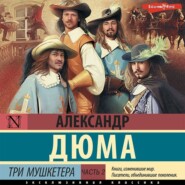По всем вопросам обращайтесь на: info@litportal.ru
(©) 2003-2024.
✖
The Prussian Terror
Настройки чтения
Размер шрифта
Высота строк
Поля
"Even I; small things make much noise, as you see." Turning to the Englishman, Benedict continued, "And now you also see why I warned Colonel Anderson that I had a favour to ask him. I want him to be my second in case, as is quite possible, some wrathful individual should arrive demanding why, being in a foreign country, I have dared to uphold the honour of my own."
His hearers, with one accord, immediately offered their hands. Benedict continued:
"And now, to show I am not absolutely unknown, here is a letter from the Head of our 'Department of Fine Arts' to Herr Kaulbach, Painter to the King of Hanover. He lives here, does he not?"
"Yes, the king had a charming house built on purpose for him."
At this moment the door communicating with the next room was thrown open, the rotund figure of the landlord appeared in the opening and a solemn and impressive voice announced:
"Their Excellencies are served."
Whether the chef had perceived that Benedict really understood what he was talking about, or else had had orders from his master to do what he was told, he had, at any rate, carried out his instructions to the very last letter, the result being neither French, English, nor German, but cosmopolitan, a banquet for a conference if not a congress. Nor was brilliant conversation lacking. Bodemeyer, like all German journalists, was a well-read man, but had never been outside Hanover. Anderson, on the contrary, had read little, but had travelled everywhere and seen much. He and Benedict had explored the same countries and encountered the same people. Both had been at the siege of Pekin; Anderson had followed Benedict in India, and preceded him in Russia. Both related their experiences, the one with English reserve and humour, the other with French vivacity and wit. The Englishman, a true modern Phœnician, saw everything from the industrial and commercial point of view, the Frenchman from that of intellectual progress. Their different ideas, brought forward with warmth and also with the courtesy of well-bred and distinguished men, crossed each other like foils in the hands of experienced fencers, emitting sparks, brilliant if transitory. Bodemeyer, unused to this style of discussion, endeavoured to give it a philosophical turn, in which he was met by Benedict, but which Anderson found difficult to follow. The journalist seemed unintelligible, but Benedict's theories he understood as he had never understood before.
The clock striking eight abruptly terminated the conversation. The editor sprang up.
"My paper!" he cried, "my 'Gazette'! It is not ready by half!" Never before had he succumbed to such an intellectual temptation. "Frenchmen are the very devil," he muttered, trying in vain to find a hat which would fit him. They are the champagne of the earth, they are clear, strong, and sparkling. In vain did Benedict entreat him for five minutes in which to write his announcement. "You must let me have it before eleven o'clock," cried Bodemeyer, as, having discovered his own hat and cane he fled as if the enemy were behind him.
Next morning the following announcement might have been read in the "Hanoverian Gazette".
"On June 7th, 1866, in Unter den Linden at Berlin I had occasion to both give and receive several blows in an encounter with various excellent citizens who wished to tear me to pieces because I had publicly emptied my glass to the glory of France. I have not the honour of knowing who gave these blows, but, wishing to be known by those who received mine, I hereby announce that during the next eight days I may be found at the Hôtel Royal, Hanover, by any one wishing to criticize either my words or actions on the said occasion, and I particularly hope that the author of a certain article referring to me in yesterday's issue of the 'Kreuz Zeitung,' will accept this invitation. Being ignorant of his name, I have no other means of addressing him.
"I wish to thank the three Prussian officers who interfered to protect me from the amiable people of Berlin. But, should any of them consider himself offended by me, my gratitude will not extend to refusing him satisfaction.
"I said then and I repeat now, that I am familiar with the use of all weapons."
"BENEDICT TURPIN.
"At the Hôtel Royal, Hanover."
CHAPTER VII
KAULBACH'S STUDIO
Benedict lost no time in leaving his note at the "Gazette" office, and his letter of introduction at Kaulbach's studio, where he left also his card on which was written, "I hope to have the honour of calling on you to-morrow." He therefore ordered Lenhart to be ready a little before eleven, in order to pay his two visits, one of thanks to Herr Bodemeyer, and one to Kaulbach. As the latter lived at the extreme end of the town where the king had had a charming little house erected for him, he called at Herr Bodemeyer's office first. The last copies of the "Gazette" were just being struck off, and Benedict was able to convince himself that his letter was actually in print. As the "Gazette" had numerous subscribers in Berlin and would be on sale there at six that evening, there was no doubt but that his communication would be widely read. The dissolution of the Chamber was confirmed and it was certain that mobilization would be announced on the morrow. Benedict continued on his way to the studio.
Seen by daylight the house appeared to be a pretty villa in Italian style, standing in a garden enclosed with iron railings. The gate stood invitingly open. Benedict entered, rang, and was answered by a servant in livery, whose manner showed that the visit was expected. He at once led the way to the studio.
"The master is just finishing dinner," he said, "but he will be with you in a moment."
"Tell the master," replied Benedict, "that I am too delighted at being able to see the beautiful things here to wish to hurry him."
And, indeed, the studio, full of original pictures, sketches, and copies of some of the works of the greatest painters known, could not fail to be intensely interesting to an artist such as Benedict, who now suddenly found himself in the sanctuary of one of the greatest of German painters. Kaulbach is an artist who has adhered to his Christian faith, and everywhere one saw proofs of this. But among highly finished sketches for some of his world-famous pictures, such as "The Dispersion of Mankind," "The Taking of Jerusalem," etc., Benedict's attention was drawn to a modern portrait group of five persons. It represented an officer, evidently of high rank, holding a boy of about ten by the hand. His charger stood ready on the terrace below, and a lady in the prime of life sat near him with two little girls, one leaning against her knee, while the other sat at her feet and played with a small dog and some roses. The picture, apparently, was a work of love, for the artist had taken immense pains with it; too much so, in fact, for the elaborately finished details threw the faces into the background, and the general effect was too flat.
Absorbed in the study of this group, Benedict did not observe that Kaulbach had entered the room and was standing beside him, looking on with a smile. Presently he said:
"You are right, that picture is too flat, and I had it brought back, not to finish it still more, but to tone it down and soften some parts. Such as it is your public would never like it. Delacroix has spoilt you for 'clean' pictures."
Benedict laughed.
"Do you mean to imply that he painted dirty ones?" he enquired.
"Heaven forbid! His works are excellent, but your nation did not appreciate them."
"We do him justice now, however."
"Yes, now that he is dead," said Kaulbach smiling. "Is it not always so?"
"Not in your case. Admired in France, adored in Germany, happily you are yet with us."
Kaulbach at this time was about fifty-two, slightly grey, sallow in complexion, having brilliant dark eyes and a highly nervous constitution. Tall and slight, he was at the zenith of his artistic powers and hardly past that of his physical ones. The two men studied each other critically, until at last Turpin began to laugh.
"Do you know what I am thinking?" asked the German. "I am wondering how you have managed to wander from Pekin to St. Petersburg, from Astrakhan to Algiers, and yet found time to produce the remarkable pictures you have painted. I know these only by report unfortunately, but I have heard a good deal. You are a pupil of Scheffer's?"
"Yes, I have also studied under Cabat."
"Great masters, both of them. And you are the hero of that unlucky business at Berlin. I have just read your letter in the 'Gazette.'"
"But why 'unlucky'?"
"Well, you will have two or three duels on your hands."
"So much the worse for my adversaries."
"Allow me to remark that you are not lacking in self-confidence."
"No, because I have the certainty of success. Look!" and Benedict held out his hand. "Observe that the line of life is double. There is not the slightest break anywhere – nothing to indicate accident, sickness, or even the slightest scratch. I might live to a hundred – but I won't say as much of those who quarrel with me."
Aulbach smiled.
"At the end of your letter of introduction," he said, "there was a postscript, which informed me that you were more deeply interested in studying occult science than in pursuing your own art."
"I don't know that I study either very much. I am rather a slave to temperament. If a thing amuses me, well, yes, I study it. If I think I have found a truth, I try to follow it out to the very end. And I do believe that chiromancy can give us a glance into the future, and that the hand is a page on which the lines of our fate have been traced by Destiny. If for five minutes only I could study the hand of either the King of Prussia or of Count Bismarck, I could give you some idea of what will happen."
"Meanwhile," said Kaulbach, "your science says you will escape scot-free from any duels arising out of this Berlin scrimmage?"
"Certainly I shall. But we were talking about your work, which is infinitely more interesting. I believe I know all your pictures, or nearly so."
"I would wager you don't know the best of them."
"Yes, I do. You mean 'Charlemagne visited in his Tomb by the Emperor Otho'? It is the masterpiece of modern German painting."
Kaulbach was evidently delighted.
"You have seen that!" he exclaimed, and he held out his hand to Benedict. "I don't think as much of it as you seem to do, but it is the best thing I have done. Oh! pardon me, but I see two visitors who come for a sitting. But wait, they are kind friends of mine, and may not object to your presence. I will tell them who you are, and then if they do not mind your being here you can please yourself as to whether you go or stay." So saying he hastily quitted the studio.
A carriage was at the garden gate, quite plain in appearance, with no arms emblazoned on the panels, yet Benedict's practised eye saw at once that the horses had cost at least £200 each. Two gentlemen were leaving it, the elder of the two, who seemed about forty-five, wore the epaulettes of a general with an undress uniform of dark green, the collar and facings being of black velvet. Kaulbach said a few words, upon which he took off an order he was wearing and also two crosses, retaining those of the Guelphic Order and of Ernest Augustus. Then, that he might cross the little garden and ascend the steps he took the arm of the younger man, who seemed to be his son, and who, tall and very slight, appeared to be about one-and-twenty, and wore a Hussar uniform of blue and silver.
Kaulbach opened the studio door and stood respectfully aside. Benedict, as he bowed, instantly recognized the central figure of Kaulbach's portrait group. He glanced quickly at the picture on which the missing decoration was depicted in all its glory. It was the Star of the Order of the Garter, worn by few except sovereign princes. He knew at once that the visitors must be the blind King of Hanover, one of the most cultivated and artistic sovereigns of Germany, and his son, the Crown Prince.

















